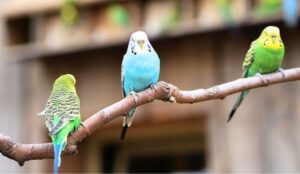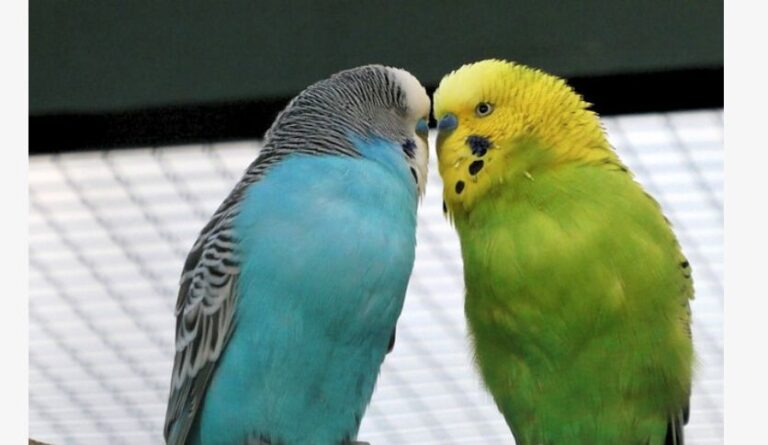If you’ve ever watched a parakeet chirping away in its cage, you might have wondered, “Do parakeets need a friend?” These small, vibrant birds are known for their playful nature and love for social interaction. In this article, we will explore the social life of parakeets. Are they happier in pairs, or do they prefer the solo life? Understanding the needs of these feathered friends is crucial for any parakeet owner who wants to ensure their pet lives a happy and fulfilling life. Join us as we delve into the world of parakeets and discover the importance of companionship in their lives.
Understanding Parakeets
Parakeets, with their bright feathers and cheerful chirps, are more than just pretty birds; they are creatures of social habits and playful spirits. To truly understand these delightful birds, we must look at their life in the wild, which paints a vivid picture of their love for companionship.
In their natural habitat, parakeets are rarely seen alone. They thrive in flocks – groups of birds that live, fly, and feed together. This flock lifestyle is not just about survival; it’s a complex social system where parakeets communicate, bond, and engage in playful activities with each other. They share a strong sense of community, often seen chattering away or participating in group grooming, known as preening. This behavior is a sign of trust and friendship among them.
The Social Dynamics of Parakeets
Parakeets, with their vibrant feathers and cheerful chirps, are more than just pretty birds; they are social creatures at heart. In the wild, these birds are rarely found alone. They thrive in groups, known as flocks, engaging in various social activities crucial for their development and well-being.
Life in the Wild: A Community Affair
Parakeets are part of a bustling community in their natural habitat, ranging from grasslands to forests. Here, their day is filled with activities involving interacting with other birds. They chatter with each other, share food, and even engage in playful antics. This constant interaction isn’t just for fun; it plays a vital role in their learning and social development.
Watching a flock of parakeets in the wild is like observing a well-orchestrated symphony. Each bird seems to know its part, whether foraging for food, looking out for predators, or nurturing their young. This social structure helps them learn vital survival skills, understand social cues, and develop communication abilities.
The Contrast with Domestic Life
When we bring parakeets into our homes, we often overlook an essential aspect of their nature – their need for social interaction. In many households, parakeets live a solitary life, which is a stark contrast to their natural social environment. While human companionship provides some interaction, it may not fully compensate for the absence of fellow feathered friends.
Parakeets can miss out on the rich social interactions they are naturally accustomed to in isolation. They lack opportunities to communicate and bond with their kind, which can be crucial for their emotional and mental health. This can lead to behaviors stemming from boredom or loneliness, such as feather plucking or excessive chirping.
The Importance of Companionship
The social dynamics of parakeets highlight the importance of companionship in their lives. Being part of a flock is a lifestyle and a survival mechanism in the wild. It influences their behavior, learning, and overall well-being. This understanding raises an important question for parakeet owners: how can we replicate or compensate for this natural social structure in a domestic setting?
As we explore the needs of these delightful birds, it becomes clear that understanding and catering to their social nature is key to ensuring they lead happy, healthy lives. Whether considering a companion for your parakeet or finding other ways to enrich their environment, recognizing the importance of social dynamics is a step towards responsible and fulfilling pet ownership.
The Benefits of Having a Companion for Your Parakeet

When it comes to the well-being of parakeets, the company they keep can make a world of difference. These bright and bubbly birds, much like us, thrive on social interactions. Let’s dive into how having a feathered companion can be a game-changer for your parakeet’s life.
1. Mutual Preening: More Than Just Grooming
Preening is an essential part of a bird’s life, and it’s not just about keeping their feathers in tip-top shape. When parakeets precede each other, it signifies trust and bonding. This mutual grooming helps them reach places they can’t on their own, ensuring they stay clean and healthy. But it’s more than just a practical activity; it’s a way of showing care and forming a deep bond.
2. Playtime Together: Keeping Spirits High
Parakeets are naturally playful, and having a buddy to frolic with can significantly boost their mood. They love to engage in games, mimic each other, and explore their environment together. This shared playtime is not just fun; it’s vital for their mental stimulation. It keeps their minds active and sharp, warding off boredom and loneliness, which can sometimes lead to behavioral issues in solitary birds.
3. Emotional Support: The Power of Companionship
Just like humans, parakeets can experience a range of emotions. Having a companion means they have constant emotional support. They share a unique bond, communicating in ways only they understand, which can be incredibly comforting. This emotional connection is especially important when they feel scared or stressed, as they can find solace in each other’s company.
4. Physical Health: A Happy Bird is a Healthy Bird
The benefits of companionship also extend to physical health. Parakeets with friends tend to be more active, engaging in more flying and playing. This increased activity level is great for cardiovascular health and helps maintain a healthy weight. Also, their happiness from being with a companion can boost their immune system, making them more resilient to illnesses.
5. Reduced Stress: A Calmer Environment
Stress is a significant factor in the health of any pet, and parakeets are no exception. A lonely parakeet can become stressed, leading to health issues like feather plucking or loss of appetite. A companion’s presence can greatly reduce stress, providing security and normalcy. They feel less isolated and more part of a community, even if it’s just a community of two.
6. An Active Lifestyle: Encouraging Natural Behaviors
Finally, having a friend encourages parakeets to engage in natural behaviors they would exhibit in the wild. This includes foraging, playing, and socializing. These activities are crucial for their well-being, ensuring they lead a balanced and fulfilling life.
Considerations Before Getting a Second Parakeet
Deciding to bring a second parakeet into your home isn’t a decision to be taken lightly. While giving your feathered friend a companion is heartwarming, several important factors must be considered to ensure a smooth transition and a happy life for both birds.
1. Space: Is There Room for Two?
First and foremost, think about space. Parakeets are active and playful birds that need room to flap their wings, play, and explore. A cramped cage can lead to stress and conflict. Ensure you have a cage large enough for two parakeets to live comfortably without invading each other’s space. This means room for separate perches, feeding areas, and enough space for flying and exercise.
2. Budget: Double the Birds, Double the Care
Owning a pet comes with costs, and adding another parakeet means doubling those expenses. This includes the initial cost of purchasing the bird and ongoing expenses like food, toys, cage maintenance, and veterinary care. Make sure your budget can comfortably accommodate these additional costs without strain.
3. Time: More Birds Require More Attention
Two parakeets mean double the responsibility. This includes cleaning, feeding, and socializing. Parakeets thrive on interaction and mental stimulation. Ask yourself if you have the extra time to nurture and bond with a second bird. Remember, neglect can lead to behavioral issues and unhappiness.
4. Introducing the New Bird: A Delicate Process
Introducing a new parakeet to your existing one is a delicate process that requires patience and careful observation. Start by keeping them in separate cages, allowing them to see and hear each other without physical interaction. This helps them get accustomed to one another’s presence. Watch their behavior closely for signs of aggression or stress. Gradually, you can allow supervised interactions until you’re confident they coexist peacefully.
5. Compatibility: Not All Birds Get Along
Just like humans, not all parakeets will naturally get along. Their personalities might clash, leading to fights or one bird bullying another. It’s important to be prepared for this possibility and have a plan. This might mean maintaining separate cages permanently if cohabitation doesn’t work out.
6. Health Considerations: Quarantine the New Arrival
When bringing a new parakeet home, it’s crucial to quarantine them initially to prevent the spread of potential diseases to your existing pet. Please consult a vet to ensure the new bird is healthy before introducing them to your parakeet.
Expert Advice on Understanding Parakeets’ Social Behavior
Regarding the social needs of parakeets, avian experts have much to say. These experts, who spend their lives studying and caring for birds, stress the importance of getting to know your feathered friend. Each parakeet is unique, and understanding their personality and needs is key to their well-being.
Observing Your Parakeet
The first step is observation. Watch how your parakeet behaves throughout the day. Does it seem happy and active, or is it often quiet and withdrawn? A parakeet that’s lively, chirping, and playing with toys is usually a happy one. On the other hand, if your bird is often silent, fluffed up, or sitting at the bottom of the cage, it might be a sign of loneliness or illness.
Understanding Their Needs
Parakeets are naturally social creatures. In the wild, they live in flocks and are rarely alone. This instinct doesn’t just disappear in a domestic setting. Experts suggest that a solitary parakeet might feel lonely and stressed, which can lead to health and behavioral issues. However, this doesn’t mean that every parakeet needs a feathered companion. Some may prefer human company and can thrive as the sole bird in the household as long as they receive plenty of attention and interaction.
Individual Personalities
Just like people, parakeets have their personalities. Some are outgoing and adventurous, while others are shy and reserved. Recognizing these traits can help you decide what’s best for your bird. For instance, a more timid parakeet might be overwhelmed by the presence of another bird, whereas an outgoing one might enjoy and benefit from a companion.
Making Decisions
Consider these observations when deciding whether to introduce a second parakeet or how to best interact with your bird. A companion might be a good idea if your parakeet seems lonely and you cannot provide constant interaction. However, if your bird thrives with human company, enjoys interaction, and seems content, it might be happier as an only pet.
Expert Tips
- Interaction: Engage with your parakeet daily through talking, playing, and training.
- Environment: Create a stimulating environment with toys, perches, and mirrors.
- Health Check: Regularly monitor your parakeet’s health and behavior for changes.
- Patience: Give your parakeet time to adjust to any new changes, whether it’s a new environment, a companion, or a change in routine.
Frequently Asked Questions (FAQs) on Do Parakeets Need a Friend?
Do parakeets get lonely?
Yes, parakeets can get lonely. They are naturally social birds, and in the wild, they live in flocks. A solitary parakeet might feel isolated, affecting its mood and health.
Is it better to have two parakeets than one?
Often, it is better to have two parakeets, especially if you cannot spend a lot of time with them. They can keep each other company and engage in natural social behaviors.
Can parakeets bond with humans instead of other birds?
Absolutely! Parakeets can form strong bonds with their human caretakers. A parakeet can be very happy with human companionship with regular interaction, play, and communication.
How do I know if my parakeet is lonely?
Signs of loneliness in parakeets include lack of vocalization, decreased activity, feather plucking, and changes in eating habits. Observing any of these behaviors might indicate that your parakeet is feeling lonely.
Will two parakeets get along automatically?
Not always. Like people, parakeets have individual personalities. Introducing a new parakeet should be done carefully to ensure they are compatible.
What if I can’t get a second parakeet?
If getting a second parakeet isn’t possible, ensure you spend quality time with your bird. Interactive toys, mirrors, and regular engagement can help keep a single parakeet entertained.
Are male or female parakeets better for pairing?
The gender of parakeets for pairing depends on their personalities. Generally, two males might get along better as females can be more territorial.
Can different types of parakeets be friends?
Yes, different types of parakeets can be friends, but it’s important to consider their size and temperament to ensure they are compatible.
What are the signs of a happy parakeet?
A happy parakeet is active, vocal, playful, and interested in its surroundings and caretaker. It will eat regularly and maintain a clean, well-preened appearance.
Conclusion
In wrapping up our exploration of whether parakeets need a friend, it’s clear that these charming birds thrive on social interaction. Whether this companionship comes from another feathered friend or a dedicated human caretaker, what matters most is that their social needs are met. Observing your parakeet’s behavior, understanding its unique personality, and providing regular interaction are key to ensuring its happiness and well-being. Remember, a content parakeet is engaged and part of a nurturing environment. So, whether you decide to introduce a new winged companion or become their primary playmate, the joy and fulfillment you bring to your parakeet’s life are what truly count.

Hi, I’m Regina Rios. Just another bird lover who loves to share knowledge from personal experience. I’ve grown up with pet birds since childhood as my mommy also loves birds. As I can’t pet many birds in open air in my house as my mom does; I created my first bird cage on my rooftop using wood, copper wire, and a metal shed in 2018 and start collecting pet birds. Now, I have so many pet birds such as Macaws, Parrot, Cockatiel, Parakeet, and others. Not only that, if I see natural birds are injured I keep them in my house until they get well. Now, my hobby becomes my income source as my home birds have babies and I sell them to birds lover like mine. I’ve created this blog to inspire others bird owners by sharing my personal knowledge. Good Luck!


